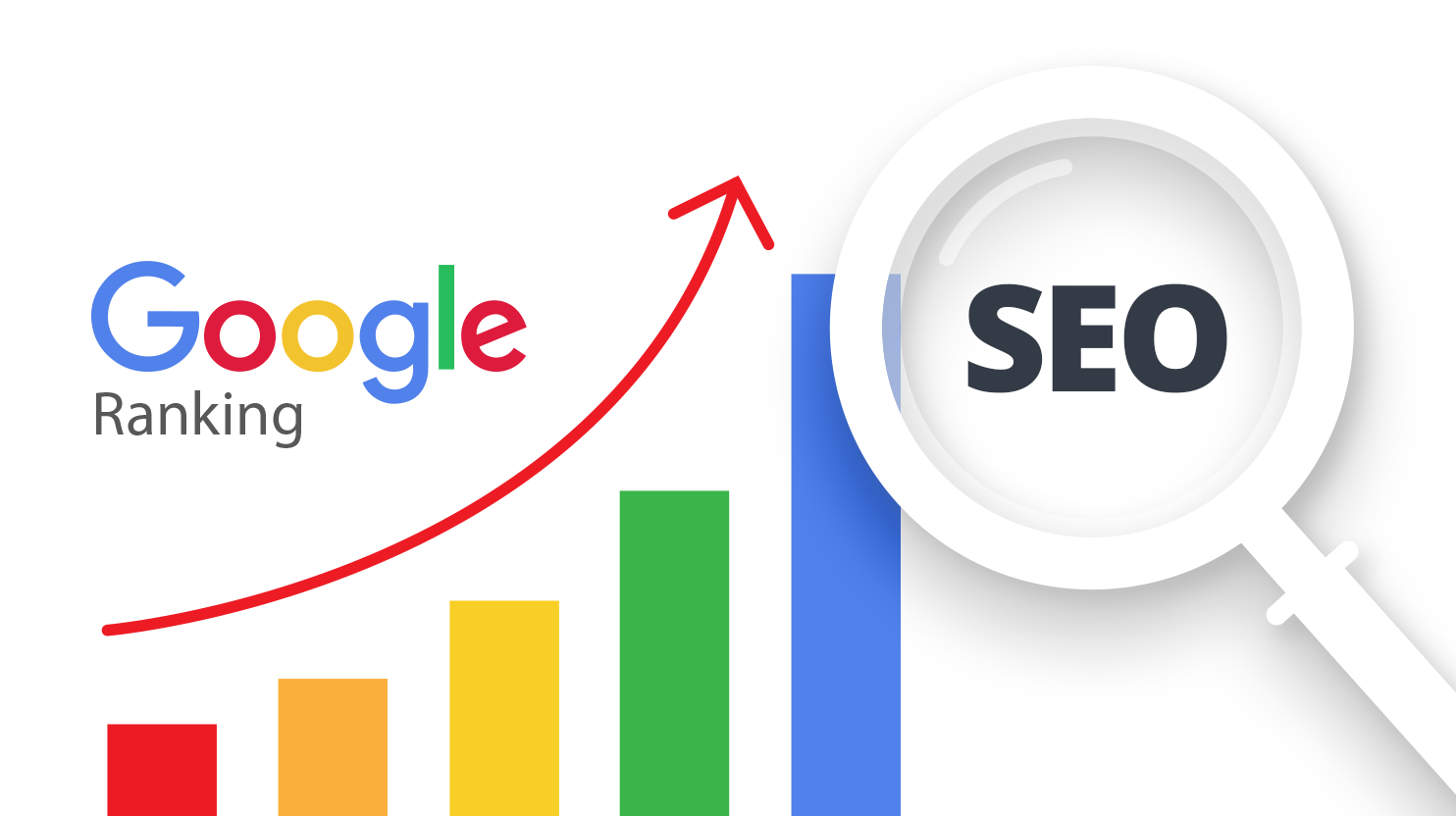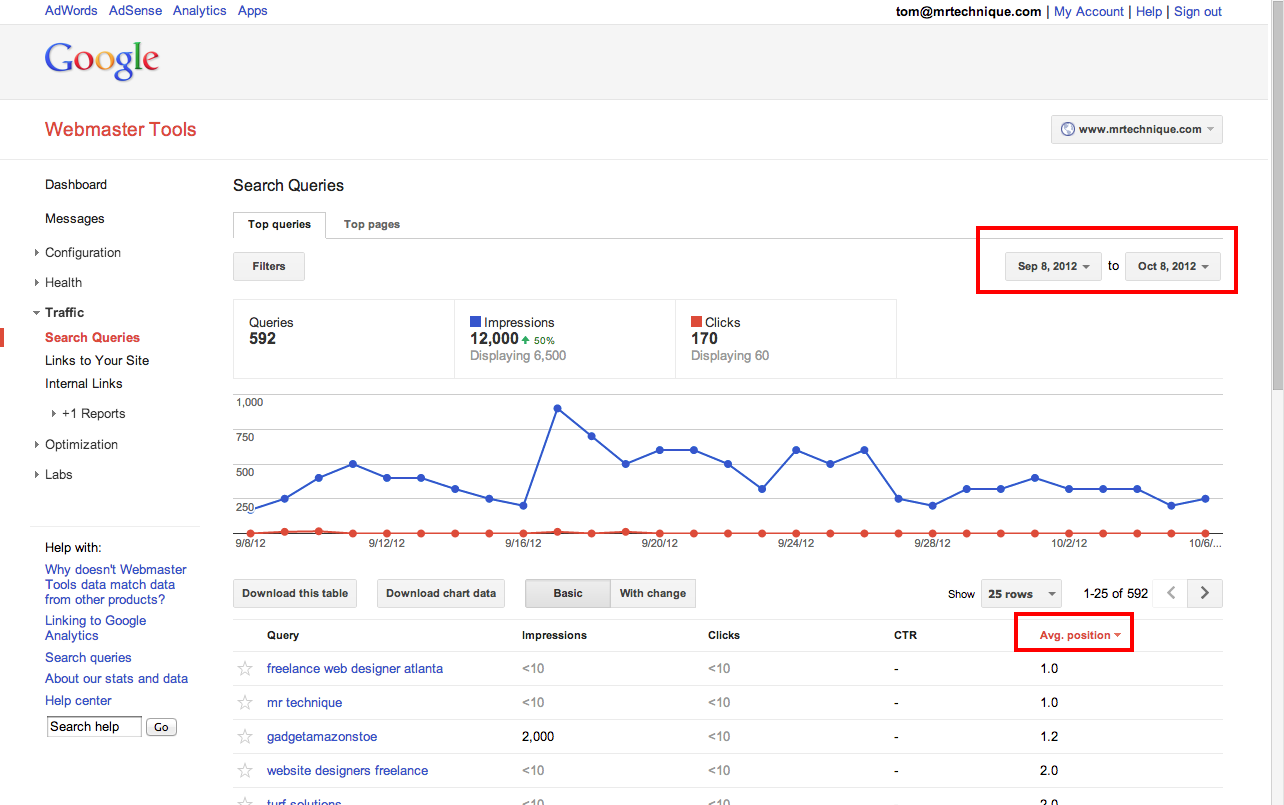Wondering how to check your Google ranking?
Google ranking refers to the position of a website or web page in the search engine results pages (SERPs) for a particular keyword or phrase. It is a crucial metric for website owners and SEO professionals as it directly impacts the visibility and traffic to a website.
There are various ways to check your Google ranking. You can use Google Search Console, a free tool provided by Google that offers insights into your website's performance in search results. Alternatively, you can perform a manual search on Google using the desired keyword and observe the position of your website in the results.
Understanding your Google ranking is important for several reasons. Firstly, it helps you gauge the effectiveness of your SEO efforts and identify areas for improvement. Secondly, it provides valuable insights into your website's visibility and reach, allowing you to make informed decisions about your content and marketing strategies. Finally, tracking your Google ranking over time can help you monitor the impact of algorithm updates and industry trends on your website's performance.
Overall, understanding and monitoring your Google ranking is essential for website owners and SEO professionals who want to improve their website's visibility, traffic, and overall success.
See Your Google Ranking
Understanding your Google ranking is crucial for website owners and SEO professionals. Here are seven key aspects to consider:
- Keyword relevance: Choose keywords that accurately reflect your website's content and target audience.
- Content quality: Create high-quality, informative, and engaging content that meets the needs of your users.
- Backlink profile: Acquire backlinks from reputable websites to improve your website's authority and credibility.
- Technical SEO: Ensure your website is technically sound, with fast loading speeds and mobile-friendliness.
- Local SEO: Optimize your website for local search results if your business serves a specific geographic area.
- Competitor analysis: Monitor your competitors' rankings and strategies to identify opportunities for improvement.
- Tracking and analysis: Regularly track your Google ranking and analyze the data to make informed decisions about your SEO strategy.
These aspects are interconnected and play a vital role in determining your website's visibility and success in search results. By focusing on these key areas, you can improve your Google ranking, drive more traffic to your website, and achieve your online marketing goals.
1. Keyword relevance
Keyword relevance is a crucial factor in determining your Google ranking. When you choose keywords that accurately reflect the content and target audience of your website, you increase the chances of your website appearing in search results for those keywords.
- Relevance to content: Your keywords should be closely related to the topics and themes covered on your website. This ensures that your website is displayed in search results for relevant queries.
- Relevance to target audience: Consider the search terms and phrases that your target audience is likely to use. By targeting relevant keywords, you can attract visitors who are genuinely interested in your products or services.
- Specificity: Choose specific keywords that accurately describe the content of your website. Avoid using overly broad or generic keywords, as they may result in lower rankings and less targeted traffic.
- Competition: Research the competition for your desired keywords. While it's important to target relevant keywords, it's also crucial to choose keywords that you have a chance of ranking for. Consider the difficulty of ranking for certain keywords and adjust your strategy accordingly.
By focusing on keyword relevance, you can improve your website's visibility in search results, attract more targeted traffic, and achieve better overall results from your SEO efforts.
2. Content quality
Content quality is a crucial factor that directly influences your Google ranking. Search engines prioritize websites that offer valuable, relevant, and well-written content that meets the needs of users.
- Informative and educational: Provide content that is informative, educational, and answers the questions that your target audience is searching for. This demonstrates your expertise and establishes your website as a credible source of information.
- Original and unique: Create original and unique content that stands out from the competition. Avoid duplicate or plagiarized content, as this can negatively impact your ranking.
- Well-written and engaging: Ensure that your content is well-written, engaging, and easy to read. Use clear and concise language, proper grammar, and an appropriate tone for your target audience.
- Visually appealing: Incorporate visually appealing elements such as images, videos, and infographics to enhance the user experience and make your content more shareable.
By focusing on content quality, you can improve your website's ranking in search results, attract more organic traffic, and establish your website as a trusted resource in your industry.
3. Backlink profile
A website's backlink profile plays a crucial role in determining its ranking in search engine results. Backlinks are links from other websites to your website. When a reputable and authoritative website links to your website, it signals to Google that your website is credible and trustworthy. This, in turn, can lead to improved rankings in search results.
- Number of backlinks: The number of backlinks to your website is an important factor in determining your ranking. However, it is not simply the quantity of backlinks that matters, but also the quality.
- Quality of backlinks: Backlinks from high-quality websites are more valuable than backlinks from low-quality websites. High-quality websites are typically those that are authoritative, relevant to your industry, and have a good reputation.
- Anchor text: The anchor text of a backlink is the visible text that is linked to your website. Google uses the anchor text to understand the context of the link and determine the relevance of your website to the search query.
- Placement of backlinks: The placement of backlinks on a web page can also affect your ranking. Backlinks that are placed in the main content of a web page are more valuable than backlinks that are placed in the sidebar or footer.
By acquiring backlinks from reputable websites, you can improve your website's authority and credibility, which can lead to improved rankings in search results. However, it is important to focus on acquiring high-quality backlinks rather than simply trying to increase the number of backlinks to your website.
4. Technical SEO
Technical SEO refers to the optimization of a website's technical aspects to improve its ranking in search engine results. It involves ensuring that your website is crawlable, indexable, and user-friendly, with fast loading speeds and a responsive design that adapts well to different devices.
- Crawlability: Search engine bots need to be able to crawl and index your website to include it in search results. Ensure that your website's structure and navigation are clear and that there are no technical barriers preventing bots from accessing your content.
- Indexability: Once your website is crawled, it needs to be indexed by search engines to appear in search results. This involves optimizing your website's content and metadata to make it easily understandable by search engine bots.
- Fast loading speeds: Page loading speed is a crucial factor in user experience and SEO ranking. Optimize your website's images, code, and overall structure to ensure that it loads quickly on all devices.
- Mobile-friendliness: With the increasing use of mobile devices, it's essential to ensure that your website is mobile-friendly. Use responsive design techniques to create a website that adapts to different screen sizes and provides a seamless user experience on all devices.
By focusing on technical SEO, you can improve your website's visibility in search results, enhance the user experience, and ultimately drive more organic traffic to your website.
5. Local SEO
Local SEO is a crucial aspect of search engine optimization (SEO) for businesses that serve a specific geographic area. By optimizing your website for local search, you can improve your visibility in search results for relevant local queries, leading to increased foot traffic and conversions.
- Proximity: Search engines prioritize websites that are located near the user's current location. Ensure your business's address and contact information are prominently displayed on your website and local listings.
- Relevance: Optimize your website's content and keywords to match the specific products or services you offer in your local area. Include location-specific keywords in your website's title, headings, and meta descriptions.
- Citations: Acquire citations from local directories, business listings, and industry-specific websites. Citations help search engines verify the authenticity and relevance of your business.
- Reviews: Encourage your customers to leave reviews on platforms like Google My Business and Yelp. Positive reviews can significantly boost your local search ranking and credibility.
By focusing on these aspects of local SEO, you can improve your website's visibility in local search results, attract more targeted traffic, and grow your business within your specific geographic area.
6. Competitor analysis
Competitor analysis plays a crucial role in understanding your position in the market and identifying areas for improvement in your SEO strategy. By monitoring your competitors' rankings and strategies, you can gain valuable insights into their strengths and weaknesses, allowing you to adjust your approach and gain a competitive edge.
One key aspect of competitor analysis is tracking their Google ranking for relevant keywords. This information can provide valuable insights into the effectiveness of their SEO efforts and the strategies they are using to achieve high rankings. By analyzing your competitors' ranking history, you can identify trends and patterns that can help you refine your own strategy and identify opportunities for improvement.
For example, if you notice that a competitor has consistently ranked higher than you for a particular keyword, you can examine their website and content to understand what they are doing differently. You may find that they have a stronger backlink profile, higher quality content, or a more effective keyword optimization strategy. By understanding your competitors' strengths and weaknesses, you can develop targeted strategies to improve your own ranking and outperform them in search results.
Additionally, competitor analysis can help you identify potential threats and opportunities in the market. By monitoring the strategies and tactics used by your competitors, you can anticipate their next moves and adjust your approach accordingly. This proactive approach allows you to stay ahead of the competition and maintain a strong position in search results.
In summary, competitor analysis is an essential component of a comprehensive SEO strategy. By monitoring your competitors' rankings and strategies, you can gain valuable insights into their approach and identify opportunities for improvement. This information can help you refine your own strategy, stay ahead of the competition, and achieve better visibility and success in search engine results.
7. Tracking and analysis
Tracking and analyzing your Google ranking is a crucial component of the broader process of "seeing your Google ranking." By regularly monitoring your ranking for relevant keywords, you gain valuable insights into the performance of your SEO strategy and can make informed decisions to improve your visibility in search results.
The data you collect from tracking your Google ranking can reveal trends and patterns that help you understand how your website is performing compared to your competitors. You can identify which keywords are driving the most traffic to your site, which pages are ranking well, and which areas need improvement. This information allows you to fine-tune your SEO strategy, optimize your content, and address any technical issues that may be affecting your ranking.
For example, if you notice a decline in your ranking for a particular keyword, you can investigate the reasons behind it. You may find that a competitor has improved their content or that a new website has entered the market and is competing for the same keywords. By analyzing the data, you can develop a strategy to address these challenges and improve your ranking.
Furthermore, tracking and analyzing your Google ranking allows you to measure the effectiveness of your SEO efforts and make data-driven decisions. By comparing your ranking over time, you can determine whether your SEO strategy is yielding positive results and identify areas where you can make adjustments to improve your performance.
In conclusion, tracking and analyzing your Google ranking is an essential part of "seeing your Google ranking" and achieving success in search engine optimization. By regularly monitoring your ranking, analyzing the data, and making informed decisions based on your findings, you can improve your website's visibility, drive more traffic to your site, and achieve your online marketing goals.
FAQs on "See Your Google Ranking"
This section addresses frequently asked questions (FAQs) about understanding and tracking your Google ranking. It provides clear and concise answers to help you gain a better understanding of this important aspect of search engine optimization (SEO).
Question 1: Why is it important to see my Google ranking?
Answer: Seeing your Google ranking is important because it provides valuable insights into the performance of your website in search results. It helps you understand how visible your website is to potential customers, track your progress over time, and make informed decisions to improve your SEO strategy.
Question 2: How can I see my Google ranking?
Answer: There are several ways to see your Google ranking. You can use Google Search Console, a free tool provided by Google, to track your website's performance in search results. Alternatively, you can perform a manual search on Google using your desired keyword and observe the position of your website in the results.
Question 3: What factors affect my Google ranking?
Answer: Your Google ranking is influenced by a variety of factors, including the relevance of your content to the search query, the authority of your website, the user experience of your website, and the backlinks pointing to your website.
Question 4: How can I improve my Google ranking?
Answer: To improve your Google ranking, focus on creating high-quality content that is relevant to your target audience, building backlinks from reputable websites, and optimizing your website for user experience. Regularly track your ranking and analyze the data to identify areas for improvement in your SEO strategy.
Question 5: What should I do if my Google ranking drops?
Answer: If you notice a drop in your Google ranking, analyze your website's performance to identify any issues that may be affecting your ranking. Check for technical errors, ensure your content is still relevant and up-to-date, and review your backlink profile to address any potential issues.
Summary: Understanding and tracking your Google ranking is essential for optimizing your website's visibility in search results and achieving your online marketing goals. By regularly monitoring your ranking, analyzing the data, and making informed decisions based on your findings, you can improve your website's performance and stay ahead of the competition.
Transition to the next article section:
See the next section for additional insights and tips on improving your Google ranking and achieving success in search engine optimization.
Conclusion
Understanding and tracking your "Google ranking" is paramount for optimizing your website's visibility, driving traffic, and achieving your online marketing goals. By employing the strategies outlined in this article, you can improve your website's ranking, stay ahead of the competition, and establish your online presence as a leader in your industry.
Remember, "seeing your Google ranking" is not merely a passive observation, but an active process that requires ongoing monitoring, analysis, and refinement. Embrace data-driven decision-making, continuously improve your content and technical SEO, and stay abreast of the latest search engine algorithms to maintain a strong ranking in search results. The rewards of enhanced visibility, increased traffic, and improved brand reputation make the effort worthwhile.


